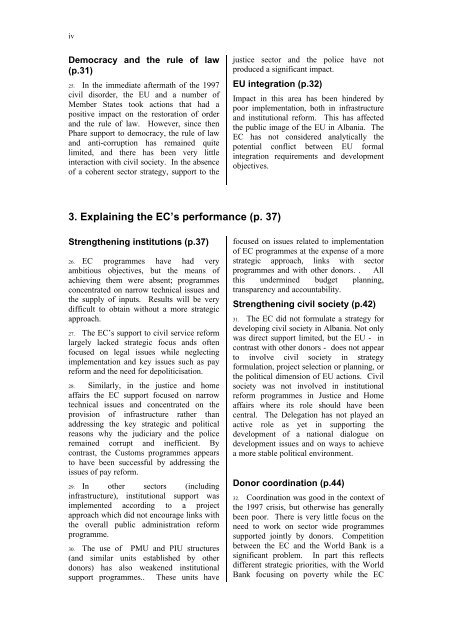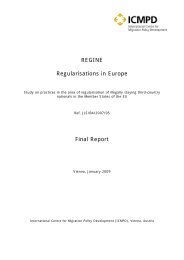Final Report - European Commission - Europa
Final Report - European Commission - Europa
Final Report - European Commission - Europa
Create successful ePaper yourself
Turn your PDF publications into a flip-book with our unique Google optimized e-Paper software.
iv<br />
Democracy and the rule of law<br />
(p.31)<br />
25. In the immediate aftermath of the 1997<br />
civil disorder, the EU and a number of<br />
Member States took actions that had a<br />
positive impact on the restoration of order<br />
and the rule of law. However, since then<br />
Phare support to democracy, the rule of law<br />
and anti-corruption has remained quite<br />
limited, and there has been very little<br />
interaction with civil society. In the absence<br />
of a coherent sector strategy, support to the<br />
justice sector and the police have not<br />
produced a significant impact.<br />
EU integration (p.32)<br />
Impact in this area has been hindered by<br />
poor implementation, both in infrastructure<br />
and institutional reform. This has affected<br />
the public image of the EU in Albania. The<br />
EC has not considered analytically the<br />
potential conflict between EU formal<br />
integration requirements and development<br />
objectives.<br />
3. Explaining the EC’s performance (p. 37)<br />
Strengthening institutions (p.37)<br />
26. EC programmes have had very<br />
ambitious objectives, but the means of<br />
achieving them were absent; programmes<br />
concentrated on narrow technical issues and<br />
the supply of inputs. Results will be very<br />
difficult to obtain without a more strategic<br />
approach.<br />
27. The EC’s support to civil service reform<br />
largely lacked strategic focus ands often<br />
focused on legal issues while neglecting<br />
implementation and key issues such as pay<br />
reform and the need for depoliticisation.<br />
28. Similarly, in the justice and home<br />
affairs the EC support focused on narrow<br />
technical issues and concentrated on the<br />
provision of infrastructure rather than<br />
addressing the key strategic and political<br />
reasons why the judiciary and the police<br />
remained corrupt and inefficient. By<br />
contrast, the Customs programmes appears<br />
to have been successful by addressing the<br />
issues of pay reform.<br />
29. In other sectors (including<br />
infrastructure), institutional support was<br />
implemented according to a project<br />
approach which did not encourage links with<br />
the overall public administration reform<br />
programme.<br />
30. The use of PMU and PIU structures<br />
(and similar units established by other<br />
donors) has also weakened institutional<br />
support programmes.. These units have<br />
focused on issues related to implementation<br />
of EC programmes at the expense of a more<br />
strategic approach, links with sector<br />
programmes and with other donors. . All<br />
this undermined budget planning,<br />
transparency and accountability.<br />
Strengthening civil society (p.42)<br />
31. The EC did not formulate a strategy for<br />
developing civil society in Albania. Not only<br />
was direct support limited, but the EU - in<br />
contrast with other donors - does not appear<br />
to involve civil society in strategy<br />
formulation, project selection or planning, or<br />
the political dimension of EU actions. Civil<br />
society was not involved in institutional<br />
reform programmes in Justice and Home<br />
affairs where its role should have been<br />
central. The Delegation has not played an<br />
active role as yet in supporting the<br />
development of a national dialogue on<br />
development issues and on ways to achieve<br />
a more stable political environment.<br />
Donor coordination (p.44)<br />
32. Coordination was good in the context of<br />
the 1997 crisis, but otherwise has generally<br />
been poor. There is very little focus on the<br />
need to work on sector wide programmes<br />
supported jointly by donors. Competition<br />
between the EC and the World Bank is a<br />
significant problem. In part this reflects<br />
different strategic priorities, with the World<br />
Bank focusing on poverty while the EC
















